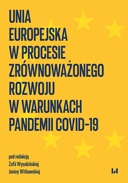Explore

Unia Europejska w procesie zrównoważonego rozwoju w warunkach pandemii COVID-19
0 Ungluers have
Faved this Work
Login to Fave
The aim of this book is to present the effects of the COVID-19 pandemic on selected sectors of the global economy and the economy of the European Union (EU), such as international trade, foreign direct investment flows, the food economy, the tourism services sector, and the textile and clothing industry. The effects of the COVID-19 pandemic have turned out to be very severe for many sectors of the global and European economy in recent years. This is indicated by the results of analyses and assessments of experts from the International Monetary Fund (IMF) and UNCTAD, as well as the conclusions of the European Commission reports. However, data on world trade in goods are more optimistic than for economic growth. The UNCTAD Report data from the end of 2021 shows that in 2021 the value of global trade in goods and services increased by approximately USD 5.2 trillion compared to 2020. The December 9, 2021 report showed that the value of global trade in goods exceeded the pre-COVID-19 level by 15%, but for the services sector, the results were weaker as the value of this trade has not yet reached pre-pandemic levels. On the other hand, good results of the increase in the intensity of trade were recorded during the pandemic in e-commerce in both its forms, i.e., Business to Business (B2B) and Business to Customer (B2C). It was related to the intensive development of the digital economy at the European and especially at the global level. In the sphere of global flows of foreign direct investment (FDI), as in other areas of international relations, serious disruptions occurred in the conditions of the COVID-19 pandemic. This was manifested in decline in global and regional FDI flows, including from and to the European Union (EU). At the same time, the implementation of ambitious goals concerning the implementation of sustainable development on a global scale (SDG 2030), and reduction of greenhouse gas emissions, including the EU goals of gradual achievement of climate neutrality, and inclusive social policy, requires the involvement of both domestic entities and international corporations. In this context, the ecological aspects of international business behavior in the EU economy were analyzed. New concepts of policy towards foreign investors, aimed at increasing their positive impact on the process of balancing EU development, were also reviewed. The pandemic has threatened the implementation of the EU's Green Deal Strategy. Progress towards climate neutrality by 2050 has been significantly disrupted and stalled, undermining previous efforts by governments and nations. Sustainable food systems and organic farming bring together the health of societies, the protection of the environment, and a good future for our planet. They have therefore become a priority goal of the European Green Deal, the EU's sustainable and inclusive growth strategy. One of the sectors of the economy that suffered the most during the COVID-19 pandemic is the tourism sector. Since the start of the COVID-19 pandemic, the border for tourists has been closed in most countries, significantly reducing tourism revenues to GDP. This has particularly hit countries with a high share of income from the tourism sector in GDP. Such countries are the coastal countries of the Western Balkans, involved in implementing the European Union's S3 smart specialization strategy in the tourism area. Montenegro is a country that stands out in this respect. It has consistently been implementing the process of accession to the European Union in recent years. The textile and clothing industry has also suffered due to the COVID-19 pandemic. One positive aspect, however, is that companies were forced to change their business models, to introduce many innovations to their operations, including a wide range of digital solutions. This book is addressed to research workers, doctoral students, and economics students at universities and colleges. It can also be used by the business community and its supporting institutions to develop new business strategies in the changing international environment.
This book is included in DOAB.
Why read this book? Have your say.
You must be logged in to comment.
Rights Information
Are you the author or publisher of this work? If so, you can claim it as yours by registering as an Unglue.it rights holder.Downloads
This work has been downloaded 36 times via unglue.it ebook links.
- 36 - pdf (CC BY-NC-ND) at Unglue.it.
Keywords
- Capital movements
- Circular Economy
- digitisation
- European Union
- globalisation
- International trade
- Migrations
Links
DOI: 10.18778/8220-933-4Editions

